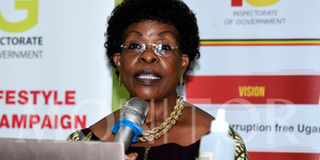Prime
15 ministry of agriculture officials plead to refund stolen Shs9b- Kamya

The Inspector General of Government (IGG) Beti Olive. PHOTO/ ISAAC KASAMANI
What you need to know:
- The officials used the stolen money to buy land in prime areas and construct posh houses in the sprawling city suburbs.
- This publication broke this story last year before the IGG said she would investigate the matter.
Ms Kamya noted that investigators from the Inspectorate of Government (IG) established that during the FY2020/21, the ministry’s technocrats transferred funds totalling to Shs10.2 billion to Bukalasa Agricultural College (BAC) and Fisheries Training Institute (FTI) at different times.
The Inspector General of Government (IGG) Beti Olive has ordered at least 15 officials from the Ministry of Agriculture, Animal Industry and Fisheries (MAAIF) to refund nearly Shs9 billion which they fictitiously spent on two agricultural schools during lockdown.
The IGG made the revelation on Friday while presenting findings of the investigation to journalists at her office in Kampala.
Ms Kamya noted that investigators from the Inspectorate of Government (IG) established that during the FY2020/21, the ministry’s technocrats transferred funds totalling to Shs10.2 billion to Bukalasa Agricultural College (BAC) and Fisheries Training Institute (FTI) at different times.
However, out of Shs10.2 billion disbursed to the two institutions, Shs8.7 billion was mismanaged and misappropriated as it was spent on non-existent activities at the schools.
Before any action could take any action, inclusive of prosecution, the culprits by their letter to the IG dated March 1, 2022 requested that they refund the amount in question.
“…the suspects undertook to refund the sum of Shs8,722,130,799 on Inspectorate of Government Asset Recovery Account Number 003030088000007 held at Bank of Uganda using EFT,” Ms Kamya said.
The terms of the agreement that were reduced in writing and signed by the parties include among others; payment of all the money misappropriated within 28 months from the date of signing the agreement, suspects to deposit securities with the IGG until full payment, and each of the 15 officials to make an initial deposit of five percent within 30 days of the agreement.
“…recovery of the funds in issue doesn’t waive the IG’s power to recommend further administrative actions such as warning, dismissal, demotion or retirement in public interest against the culpable persons,” she said.
She however, said that the IG reserves the powers and rights to pursue the matter criminally or administratively against any person that shall breach all or any other the terms of the agreement.
But she declined to name the officials, saying that revealing their identity would be a breach of the agreement which they made with the Inspectorate.
Mr Ejang Paul who was the lead investigator in the MAAIF case said that there was connivance between the heads of the agricultural institutions and officials from the Ministry.
“The heads of the institutions initiated fictitious budgets and sent them to the technocrats at the ministry who would then pay and share the money. Some of the companies to which the money was paid belonged to the ministry’s officials,” Mr Ejang said.
The director in charge of legal affairs, Ms Sarah Birungi Kalibbala noted that the officials used the stolen money to buy land in prime areas and construct posh houses in the sprawling city suburbs.
She said the IG has since put a caveat on these properties until the officials pay back the money.
This publication broke this story last year before the IGG said she would investigate the matter.
Our story chronicled exclusive details of unnamed government officials who wired about Shs10billion to the two agricultural training institutions ostensibly for “’settlement of students’ bills’ and infrastructure despite all schools being closed during the Covid-induced lockdown.
The monies were sent to Fisheries Training Institute Entebbe and Bukalasa Agricultural College, Wobulenzi in Luwero District in several tranches between October 2020 and August, with some of the expenditure appearing to be repeated.
Information posted on the Integrated Financial Management System (IFMS), a centralised government repository for financial, budgetary and accounting operations, shows that money was also disbursed for procurement of fishing gear for students and hostel rehabilitation.
Other big-ticket expenditures were on inputs, procurement of sanitary materials, repairing septic tanks and latrines, plumbing, fencing and repair and maintenance of roads.
Ministry of Agriculture Permanent Secretary, Maj Gen David Kasura-Kyomukama, said then that no such audit query had been raised in the ended 2020/2021 Financial Year, but nonetheless his team would inquire into the allegations.
“The Ministry [of Agriculture] is not aware of any reported cases of misuse of funds. However, since the emergence of the story, management has tasked the relevant offices to look into the matter. We remain committed to upholding the strictest standards of accountability for public resources and punishing those found guilty of misappropriating them,” he said last year in a reply to our inquiries.
He added: “The Institutes have an average appropriated annual budget of Shs2.6 billion to cater for students’ maintenance, feeding, purchase of scholastic materials and undertaking development projects such as construction and maintenance of infrastructure…”





